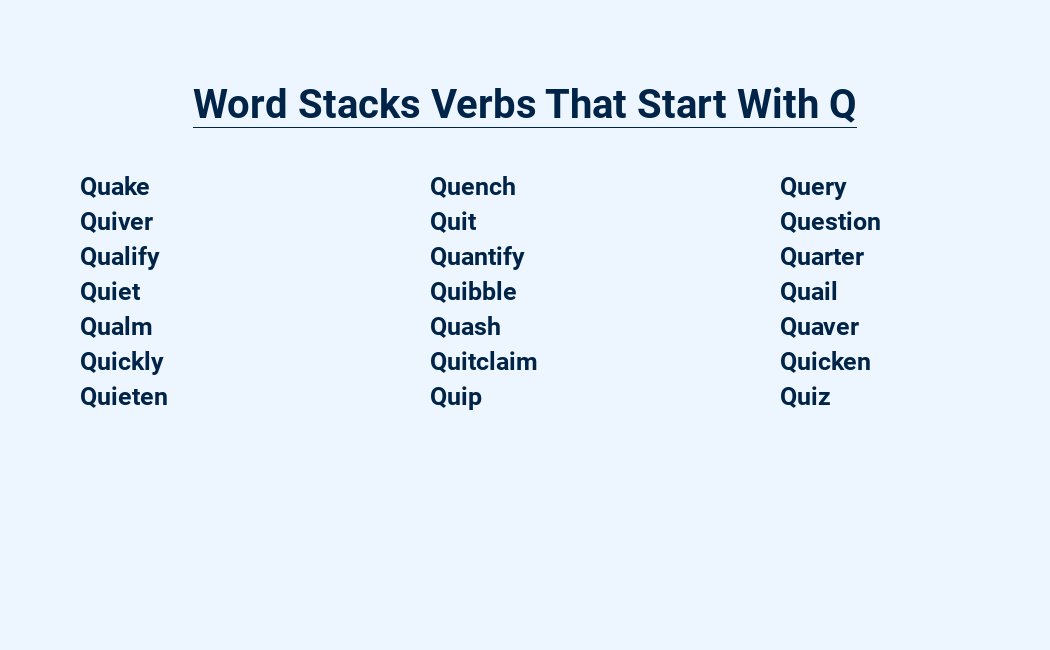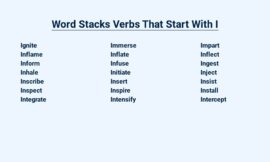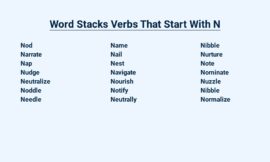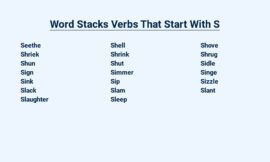Embark on a linguistic journey as we delve into the world of verbs starting with “Q.” Quench your thirst for knowledge with captivating examples of how words like “query,” “quake,” “qualify,” and “quantify” add depth and nuance to the English language. Discover the power of these verbs to enhance your communication and captivate your audience.
| Verb | Meaning |
| Quake | To shake or tremble, especially from an earthquake. |
| Qualify | To meet the necessary requirements or standards. |
| Question | To ask a question or series of questions. |
| Queue | To form a line or wait in line. |
| Quibble | To argue or complain about trivial or unimportant matters. |
| Quicken | To move or act more quickly. |
| Quiet | To become or make silent or still. |
Quench
To satisfy a thirst or desire
Quench your thirst with a refreshing drink or satisfy your desire for knowledge with an informative book.
To extinguish a fire or flame
Quench the fire’s thirst with water’s embrace, Smother its hunger with earth’s gentle touch, Choke its breath with a blanket’s smothering kiss, Starve its fury by severing its fuel’s lifeline.
To cool or reduce the intensity of something
Quench your thirst with a refreshing drink on a hot summer day. Douse the flames with a bucket of water to prevent the fire from spreading.
Subdue your anger by taking a deep breath and counting to ten.
To suppress or subdue a feeling or emotion
Quell: To suppress or subdue a feeling or emotion.
This verb aptly captures the act of taming tumultuous emotions or quashing unsettling thoughts.
It evokes a sense of control, like a conductor skillfully quieting a roaring symphony.
Query
To ask a question or seek information
- Question: Inquire, Interrogate, Query
- Seek: Ask, Enquire, Inquire, Investigate, Solicit
To inquire or investigate
To inquire or investigate involves seeking knowledge, information, or facts through questioning, research, or examination.
It encompasses asking questions, conducting investigations, and gathering evidence to gain a deeper understanding or resolve uncertainties.
To examine or test the validity of something
Scrutinize: To examine closely and critically. Probe: To investigate or examine thoroughly.
Question: To ask about or investigate.
Query: To ask for information or knowledge. Challenge: To question or dispute the validity of something.
To challenge or dispute a statement or claim
- Contest: Openly oppose or resist (a statement, idea, or decision.
- Contradict: Assert the opposite of (a statement, idea, or belief.
- Debate: Engage in a formal discussion on a particular topic, typically with opposing viewpoints.
- Refute: Prove or demonstrate the falseness or error of (a statement or theory.
Quake
To tremble or shake violently
Quaver: To tremble or shake violently, often due to fear, excitement, or cold. Quiver: To tremble or shake with a rapid, slight motion, often due to excitement, fear, or anticipation.
To experience a sudden or intense emotion
Quake with emotion, a sudden rush, Heartstrings plucked, feelings aflush.
Surge and ebb, a tempest’s might, Emotions’ dance, day and night.
To cause something to tremble or shake
Quaver: To shake or tremble with a slight, rapid motion. Quake: To shake or tremble, especially as a result of an earthquake or other violent disturbance.
To produce a sound or vibration
Quaver, quiver, quake, all exemplify the act of producing sound or vibration. These verbs vividly capture the trembling, shaking, and resonating motions that generate auditory or tactile sensations.
Qualify
To meet the necessary requirements or standards
- Qualify: Fulfilling criteria or conditions.
- Quantify: Determining the amount or number of something.
To be eligible or suitable for something
Qualify: To possess the necessary skills, knowledge, or experience to be eligible or suitable for something.
Examples:
- The candidate is well-qualified for the position.
- The company must qualify all suppliers before awarding contracts.
To add or specify the details or qualities of something
Qualify can be used to describe adding or specifying the details or qualities of something.
It’s often used in the context of describing a person’s skills or abilities, or the requirements for a job or task.
To describe or characterize something
Qualify can be used to describe or characterize something as meeting certain standards or requirements.
It can also be used to describe a person as possessing the necessary skills or qualities for a particular job or task.
Quantify
To measure or determine the quantity or amount of something
Quantify: To determine the quantity or amount of something. This can be done through various methods such as counting, measuring, or estimating.
Quantification is essential in various fields including science, engineering, and economics.
To express something in numerical terms
Quantify: To express something in numerical terms is to assign a numerical value or amount to it, allowing for precise measurement, comparison, and analysis. This process involves converting qualitative data into quantitative data, enabling objective evaluation and statistical treatment.
To estimate or calculate the value or significance of something
Quantify: Ascertain the magnitude, amount, or degree of something. Determine the quantity or value of something.
Express something in terms of quantity.
To make something more precise or definite
Quantify: To determine or express something in terms of quantity or measurable terms. It involves converting qualitative data into numerical data, making it more precise and definite for analysis and comparison.
Final Verdict
The spectrum of verbs beginning with “Q” offers a nuanced and diverse range of actions and states.
From quenching thirst to querying for information, from experiencing quakes to qualifying for opportunities, and from quantifying data to qualifying statements, these verbs capture the essence of human experiences, interactions, and intellectual pursuits.
Their application across various domains enriches our vocabulary and enhances our ability to express ourselves effectively.




